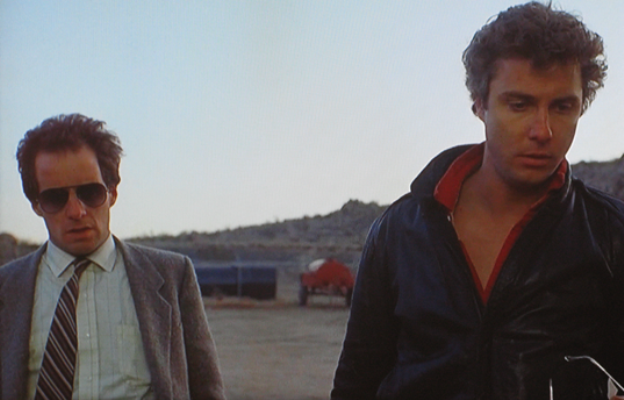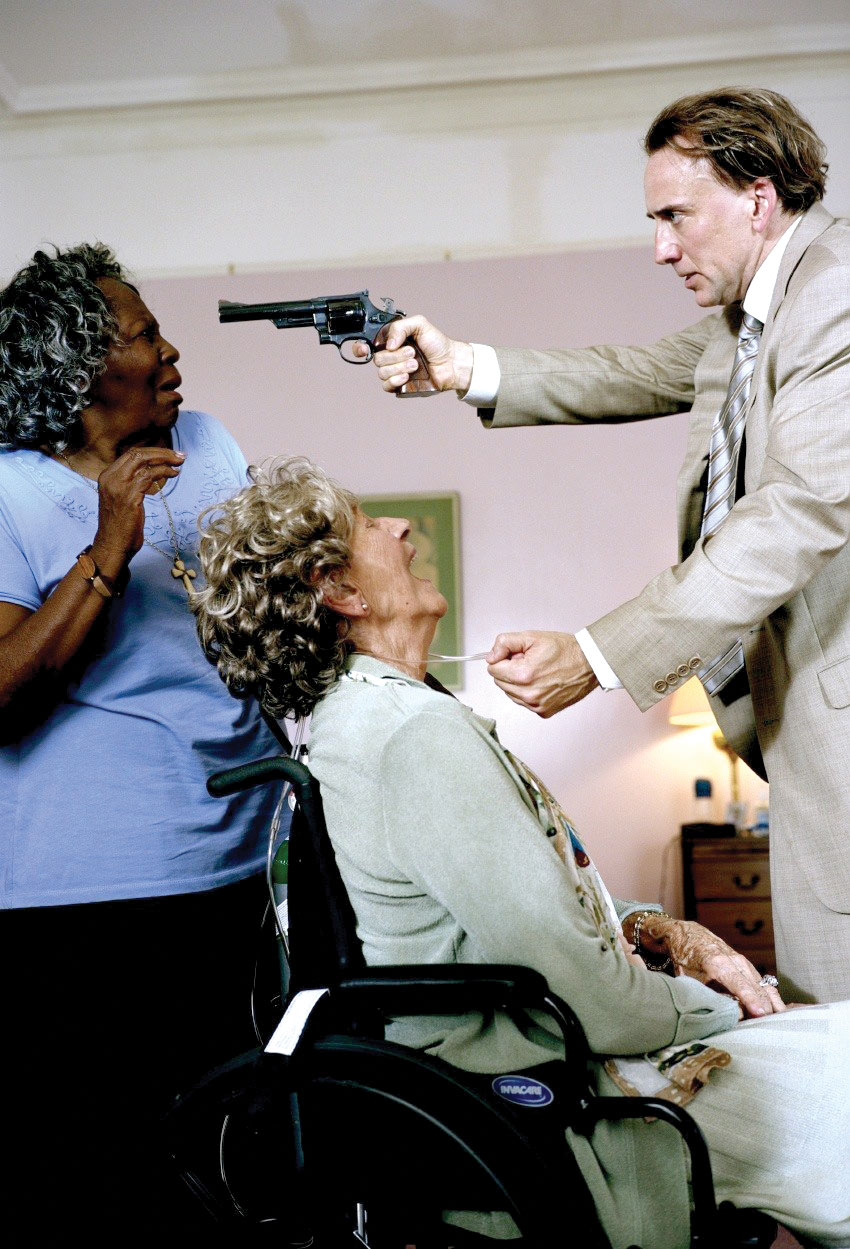Heavenly Creatures (1994) directed by Peter Jackson
Within the first two minutes of Heavenly Creatures I was hooked right in. It opens with a series of Pleasantville-style clips of Christchurch, New Zealand, then cuts to the two girls Pauline and Juliet running through the woods screaming at the top of their lungs. The scene is frantic, mysterious, foreboding, almost scary, and in the end we get to see their faces more clearly, splattered with blood. Something terrible has just happened. The screen fades to black with this inscription: "During 1953 and 1954 Pauline Yvonne Parker kept diaries recording her friendship with Juliet Marion Hulme. This is their story. All diary entries are in Pauline's own words." And now the film begins.
This opening scene gives all the subsequent scenes an eerie sense of doom since we know how it is going to end. We get to see the two girls' relationship with each other grow to unhealthy levels while nobody around them really understands the true depth of their obsession. Even when the parents voice their concern, they really have no idea just how far gone Pauline and Juliet have become.
Pauline is sort of a loner at school but is immediately intrigued by the new girl Juliet, who within a couple minutes is already correcting the French teacher. Pauline, normally so reserved, is drawn to Juliet's bold personality and love of the arts and in turn, Juliet can appreciate Pauline's receptiveness and wild imagination. The two girls are practically joined at the hip upon meeting each other, laughing and giggling to themselves, immersed in their own little world in more ways than anyone could imagine. They create their own fantasy world of Borovnia where, as the film progresses, they visit more frequently and with more intensity to the point where they, and the viewer, cannot differentiate between fantasy and reality. Director Peter Jackson blends the fantasy elements into the film with such style and imagination that I sort of slipped into their world with them. It is a truly unique and imaginative film.
The intensity of their relationship is so overwhelming that its almost suffocating. It is even more than just love (the film implies some homosexuality), it is infatuation and obsession. They are so emotionally intertwined with each other that attempting to break them apart will prove deadly. However, as is the case in many instances, if the two never met each other in the first place, they probably would have turned out okay. It was just a matter of two emotionally disturbed people coming together at the right time.
This film is notable for being Kate Winslet's debut role and she is really good here as Juliet. It's always interesting seeing one of an established actor's earlier roles and she basically looks exactly like she does now and has the same kind of presence to her in her other films. This was also Melanie Lynskey's debut role as well, who plays Pauline and is equally up to task. I actually don't really recognize her at all, even though after looking at her filmography, I've seen a bunch of her movies. I wonder why their careers have diverged so much despite starting at the same point. It's sad to say but I strongly suspect looks has a lot to do with it; Kate Winslet has always been pretty.
Anyways, this is a great film that left me sort of reeling. I think more than anything it is really good at conveying the psychology of the two characters, which is enhanced by the film's wonderfully strange fantasy elements. Forget Lord of the Rings, this is Peter Jackson's real masterpiece.
It is interesting to note that Juliet Hulme only spent five years in prison and has since changed her name to Anne Perry, a best selling crime fiction author who's now 72. It's kind of crazy to think about really after watching this film.
Grade: A
Within the first two minutes of Heavenly Creatures I was hooked right in. It opens with a series of Pleasantville-style clips of Christchurch, New Zealand, then cuts to the two girls Pauline and Juliet running through the woods screaming at the top of their lungs. The scene is frantic, mysterious, foreboding, almost scary, and in the end we get to see their faces more clearly, splattered with blood. Something terrible has just happened. The screen fades to black with this inscription: "During 1953 and 1954 Pauline Yvonne Parker kept diaries recording her friendship with Juliet Marion Hulme. This is their story. All diary entries are in Pauline's own words." And now the film begins.
This opening scene gives all the subsequent scenes an eerie sense of doom since we know how it is going to end. We get to see the two girls' relationship with each other grow to unhealthy levels while nobody around them really understands the true depth of their obsession. Even when the parents voice their concern, they really have no idea just how far gone Pauline and Juliet have become.
Pauline is sort of a loner at school but is immediately intrigued by the new girl Juliet, who within a couple minutes is already correcting the French teacher. Pauline, normally so reserved, is drawn to Juliet's bold personality and love of the arts and in turn, Juliet can appreciate Pauline's receptiveness and wild imagination. The two girls are practically joined at the hip upon meeting each other, laughing and giggling to themselves, immersed in their own little world in more ways than anyone could imagine. They create their own fantasy world of Borovnia where, as the film progresses, they visit more frequently and with more intensity to the point where they, and the viewer, cannot differentiate between fantasy and reality. Director Peter Jackson blends the fantasy elements into the film with such style and imagination that I sort of slipped into their world with them. It is a truly unique and imaginative film.
The intensity of their relationship is so overwhelming that its almost suffocating. It is even more than just love (the film implies some homosexuality), it is infatuation and obsession. They are so emotionally intertwined with each other that attempting to break them apart will prove deadly. However, as is the case in many instances, if the two never met each other in the first place, they probably would have turned out okay. It was just a matter of two emotionally disturbed people coming together at the right time.
This film is notable for being Kate Winslet's debut role and she is really good here as Juliet. It's always interesting seeing one of an established actor's earlier roles and she basically looks exactly like she does now and has the same kind of presence to her in her other films. This was also Melanie Lynskey's debut role as well, who plays Pauline and is equally up to task. I actually don't really recognize her at all, even though after looking at her filmography, I've seen a bunch of her movies. I wonder why their careers have diverged so much despite starting at the same point. It's sad to say but I strongly suspect looks has a lot to do with it; Kate Winslet has always been pretty.
Anyways, this is a great film that left me sort of reeling. I think more than anything it is really good at conveying the psychology of the two characters, which is enhanced by the film's wonderfully strange fantasy elements. Forget Lord of the Rings, this is Peter Jackson's real masterpiece.
It is interesting to note that Juliet Hulme only spent five years in prison and has since changed her name to Anne Perry, a best selling crime fiction author who's now 72. It's kind of crazy to think about really after watching this film.
Grade: A























